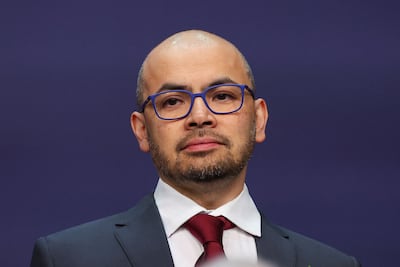The Nobel Prize in Chemistry has been awarded to two Google computer scientists for their work on protein structures, the Royal Swedish Academy of Sciences has announced.
British-born Demis Hassabis and American John Jumper, who both work for Google DeepMind, were awarded half of the prize for their work on protein structure prediction.
US-born David Baker, who works at the University of Washington in Seattle, was given the other half of the prize for his work on computational protein design.
“One of the discoveries being recognised this year concerns the construction of spectacular proteins. The other is about fulfilling a 50-year-old dream: predicting protein structures from their amino acid sequences. Both of these discoveries open up vast possibilities,” says Heiner Linke, chairman of the Nobel Committee for Chemistry.
Mr Hassabis is the chief executive and co-founder of London-based artificial intelligence start-up Google DeepMind, an artificial intelligence research laboratory that serves as a subsidiary of Google.
In 2020, Mr Hassabis and Dr Jumper presented an AI model called AlphaFold2. With its help, they have been able to predict the structure of virtually all the 200 million proteins that researchers have identified. Since their breakthrough, AlphaFold2 has been used by more than two million people from 190 countries.

Mr Hassabis was born in London in 1976 and received his PhD from University College London.
In its announcement, the Royal Swedish Academy of Sciences said David Baker succeeded with the almost impossible feat of building entirely new kinds of proteins.
Following the announcement, Mr Baker said he was “deeply honoured” and that “stood on the shoulders of giants”. He said colleagues “had already shown the signs that protein design was possible” and others had helped him in protein design.
Earlier this year, Time magazine named Mr Baker, director of the Institute for Protein Design at the University of Washington, as one of the 100 most influential people in health.
Last year, the Nobel Prize in Chemistry was also given to three scientists – Moungi Bawendi, Louis Brus and Aleksey Yekimov, for their discovery and synthesis of quantum dot.
Previous winners include Polish scientist Marie Curie, who won in 1911 for the discovery of radium and polonium. Eight years earlier, she had been awarded the Nobel Physics Prize for research on radiation.
On Tuesday, the Nobel Prize in Physics was awarded to John Hopfield and Geoffrey Hinton, known as the “godfather of artificial intelligence”, for their work on machine learning and artificial neural networks.
Americans Victor Ambros and Gary Ruvkun were awarded the medicine prize for their discovery of microRNA, a fundamental principle governing how gene activity is regulated.
The prize carries a cash award of 11 million Swedish kronor ($1 million) from a bequest left by its creator, the Swedish inventor Alfred Nobel.


